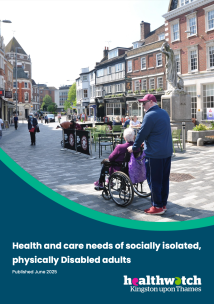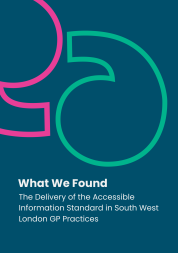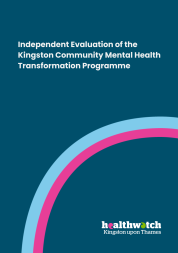Health and care needs of socially isolated, physically Disabled adults (2024-25)

Read the report
If you require this report in a different format, please contact us by emailing info@healthwatchkingston.org.uk
Introduction
Healthwatch Kingston ran four community engagement workshops on the health and care needs of socially isolated, physically Disabled adults. Three face-to-face and one online. Healthwatch Kingston has collaborated with the Kingston Centre for Independent Living (KCIL) to deliver this project.
What is social isolation?
Social isolation means being alone a lot and not having people to talk to or do things with. It can happen when someone struggles to get out, make friends, or join activities.
For physically Disabled people, this can be made worse by transport, support, or accessible places. This can make people feel lonely, left out, and unhappy.
Everyone should have the opportunity to be part of their local community, feel included and treated equitably.
Methodology
Healthwatch Kingston held four community engagement workshops at venues recommended by KCIL as they have good Disability access. The face-to-face workshops were held at Hook and Chessington Library, United Reformed Church (URC) in Kingston town centre, Searchlight Centre in New Malden, and our forth workshop was held online in the evening (via Zoom) to enable participation from people who worked during the day or were less physically mobile to attend a face-to-face workshop.
Workshop dates:
- Friday 24 January 2024– Chessington Library (daytime)
- Tuesday 28th January 2024- Kingston United Reformed Church (daytime
- Thursday 6th February 2024– Online via Zoom (evening)
- Monday 10th February 2024 - Searchlight Centre (daytime)
The Searchlight Centre workshop was held during an Eco-Op ‘day centre’ session, and attracted a diverse group of attendees, including people with physical and learning disabilities, and their carers (family and professionals).
Healthwatch Kingston raised awareness about our community engagement workshops through:
- Healthwatch Kingston website, social media and our e-news mailing list
- Kingston Centre for Independent Living mailing list
- Healthwatch Kingston Open Meetings
- Printed information at other community engagement and outreach events
- Kingston All Age Learning Disability Partnership Board
- Kingston Mental Health and Wellbeing Group
- Kingston Disability Network
- Kingston and Richmond Comms and Engagement Group
- Kingston Voluntary Action and other local VCSE newsletters.
The final report has been informed by 39 people. 37 of these attended workshops, and a further two contributed their feedback online.
Recommendations
Kingston Council, NHS providers, VCSE organisations, and transport authorities are requested to consider the following recommendations:
Service delivery and coordination
- Develop integrated care coordination across health and social care for Disabled adults.
- Improve continuity of care and communication between NHS services and other providers.
- Ensure transport options are not a barrier to attending appointments.
- Ensure consistent respite and longer visit times for carers, especially those supporting individuals with complex needs.
Accessibility and infrastructure
- Increase investment in accessible infrastructure, including public toilets, crossings, ‘Changing Places’ facilities, and step-free access.
Healthwatch Kingston ‘Health and care needs of socially isolated, physically Disabled adults’
- Provide more physically accessible and affordable venues for activities, particularly for adults 25–65.
- Reinstate and strengthen disability awareness training for transport staff and the public.
Information and communication
- Improve the usability and accessibility of Connected Kingston and other local information platforms.
- Offer printed, phone-based, and in-person information channels to reach digitally excluded residents.
- Promote a centralised, regularly updated “what’s on” guide, including details about accessibility.
Inclusion and representation
- Ensure Disabled people are involved in all stages of service design, especially in major public planning.
- Embed cultural competence and anti-discrimination training in all frontline services.
- Recognise the impact of social isolation on mental health and invest in community-led befriending, peer support, and inclusive events.

